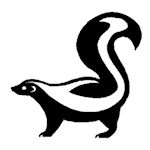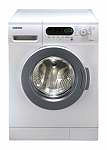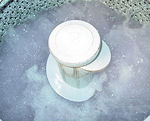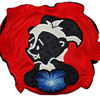Stripping Cloth Diapers
Stripping Cloth Diapers - Strip Cloth Diapers
 Over time you may notice that your cloth diapers no longer smell April fresh, even right after laundering. This usually means that they have build-up and need a good stripping. Build-up occurs when residue left by detergents, oils or other substances remain in the fibers. Diapers with either super-absorbant hemp or man-made materials like microfleece tend to gather stink more easily than diapers with all-natural fibers like cotton or bamboo. If the funky smell wasn't bad enough, build up can also decrease the absorbency of your diapers and cause leaking. But don't worry, removing build-up by stripping your cloth diapers is really easy - we'll show you how!
Over time you may notice that your cloth diapers no longer smell April fresh, even right after laundering. This usually means that they have build-up and need a good stripping. Build-up occurs when residue left by detergents, oils or other substances remain in the fibers. Diapers with either super-absorbant hemp or man-made materials like microfleece tend to gather stink more easily than diapers with all-natural fibers like cotton or bamboo. If the funky smell wasn't bad enough, build up can also decrease the absorbency of your diapers and cause leaking. But don't worry, removing build-up by stripping your cloth diapers is really easy - we'll show you how!
Stripping Cloth Diapers - Hot Water
If your diapers are dirty as well as stinky you should wash them before stripping, otherwise stains may be set in. Freshly washed diapers don't need to be dried before stripping, you can strip right after washing. Before stripping be sure to check the washing instructions for your diapers so you don't accidentally damage them.
Wash
 Place your stinky diapers in the washing machine and run them through a hot wash with NO detergent. Top loading machines are slightly easier to use when stripping because you can lift the lid to check for bubbles. They may also be more effecient at stripping due to the large amount of water they use. However, front loading washers can also be used successfully, it may take more cycles plus a bit of creativity and a flashlight to see bubbles.
Place your stinky diapers in the washing machine and run them through a hot wash with NO detergent. Top loading machines are slightly easier to use when stripping because you can lift the lid to check for bubbles. They may also be more effecient at stripping due to the large amount of water they use. However, front loading washers can also be used successfully, it may take more cycles plus a bit of creativity and a flashlight to see bubbles.
The water should be as hot as possible so you may want to turn your water heater up beforehand, or boil water on the stove to add to the washer. If you change your water heater temperature be sure to turn it back down afterwards!
Rinse
 Rinse, rinse, rinse your cloth diapers in the hottest water your machine will allow. Peek into the washer during the rinse to see if there are soap bubbles on top of the water. Continue running rinse cycles until there are no more soap bubbles. It could take four or more rinses to get rid of all the bubbles. Don't confuse soap bubbles with agitation bubbles - agitation bubbles will disappate quickly if you stop the washer while soap bubbles will hang around a bit.
Rinse, rinse, rinse your cloth diapers in the hottest water your machine will allow. Peek into the washer during the rinse to see if there are soap bubbles on top of the water. Continue running rinse cycles until there are no more soap bubbles. It could take four or more rinses to get rid of all the bubbles. Don't confuse soap bubbles with agitation bubbles - agitation bubbles will disappate quickly if you stop the washer while soap bubbles will hang around a bit.
If your machine allows for hot washes with hot or warm rinses you could substitute hot/hot or hot/warm wash cycles for the numerous rinse cycles. My machine only has hot/cold, warm/warm, warm/cold and cold/cold choices so I generally run a hot/cold cycle then a warm/warm cycle in place of two separate rinse cycles.
"For a machine with a hot/warm cycle you can turn off the cold intake and turn up the hot intake taps on the back of the machine. It will only have hot water to fill with so you will have a hot/hot wash rinse. For a machine with no hot/warm option reverse the hot and cold intake hoses on the back of the machine so that it fills from the hot water on the cold cycle, and set for cold/cold. I would not do this on a daily washing basis - ONLY for stripping (which ties the machine up for a day anyway). Just be sure to replace all the intake settings when you are done." Thanks to Sarah D. for this tip!
Stripping Cloth Diapers - Alternative Methods
Although stripping cloth diapers is generally done at home in the washing machine, there are other ways to strip.
Dishwasher Stripping
Some cloth diapering mamas have had success using the dishwasher to strip their cloth diapers. They claim that the dishwasher provides hotter wather than a washing machine. Due to the potential fire hazard we do NOT recommend this method of stripping. If you are worried that your water isn't hot enough, turn your water heater up or add some boiling water to the washer. Don't put snapping cloth diapers into the pot though, because the snaps may melt.
Laundromat Stripping
If you don't think you can get hot enough water at home, try stripping at a local laundromat. Most laundromats have hotter water and larger machines with greater water capacity than home washers. You may want to run an empty hot cycle before stripping in case there's detergent build-up inside the machine.
Stripping by Hand
You may want to try stripping by hand if you only have a few stinky diapers, but we don't recommend this method for a lot of diapers. Use the hottest water you can stand, and wear rubber gloves to insulate your hands and keep them from becoming sandpaper rough.
If Stripping Doesn't Work
 If you've tried everything above and your diapers still scare the skunks away, maybe build-up isn't the problem. Consider these reasons:
If you've tried everything above and your diapers still scare the skunks away, maybe build-up isn't the problem. Consider these reasons:
Not Enough Detergent
So you've cut down on the amount of detergent you're using, you've stripped and stripped, but your diapers still stink? It could be that you're not using enough detergent. Try running a hot wash with a full cup of detergent then rinse, rinse, rinse.
Vinegar in Hard Water
If you have hard water and use vinegar the acid in the vinegar could be reacting with the minerals in the water and causing odor. Adding a water softener like Calgon to the wash cycle and cutting down or eliminating the vinegar may help in this case. Try 1/4 capful to begin with and use more or less as needed.
Stripping Cloth Diapers - Additives
Sometimes cloth diapers need a little more than plain hot water to get completely stripped. If your diapers are still leaking or a faint odor remains after hot water stripping, you may want to try some of these ideas. Because the effectiveness of these methods depends on what kind of water you have and what kind of diapers you use, these methods won't work for everyone. Keep trying until you find one that works for you.
 |
Bac-Out by Bi-O-Kleen is a natural alternative containing a unique blend of natural living enzyme cultures and botanical extracts. Bac-Out has been successfully used for stripping by some cloth diapering mamas, however other mamas have reported that their little ones developed a rash from diapers washed with Bac-Out. If you choose to use Bac-Out be sure to rinse a lot and keep an eye out for rashes. |
 |
Baking Soda has been trusted for over 100 years as an effective yet natural and gentle cleaner with no harsh chemicals. Baking soda natural effect is to balance pH, keeping things neither too acidic nor too alkaline, and it resists further changes in the pH balance. Add 1/2 to 1 cup to the wash cycle to neutralize and eliminate odors. Then rinse until there are no more bubbles. |
 |
Calgon and other water softeners can help with stripping by removing hard water minerals that trap dirt into fabric fibers. Calgon also helps to prevent detergent build-up, neutralizes the hard water minerals in your water, and contains no phosphates. Expect lots of bubbles when using water softeners, so be sure to rinse until they're gone. |
 |
Dawn Dish Soap Add a squirt or two of original Dawn dish soap to your washer and run a hot wash, then rinse until there are no more bubbles. Dawn is a degreasing agent and helps stripping by removing oily residue. If your microfleece is repelling (not allowing wetness to penetrate) try scrubbing a little Dawn right into the microfleece with a medium bristle brush. Be sure to rinse, rinse, rinse until the water runs clear. |
 |
OxiClean Use OxiClean to help remove residue and improve stripping effeciency. OxiClean is an alkaline laundry booster containing chlorine and phosphorus, and is safe for laundry. Try one to two scoops in your hot wash and as usual, rinse until there are no more bubbles. |
 |
RLR by Cadie is not a bleach, blueing agent, or detergent. It removes dried-in mineral deposits and detergent residue from fabrics, pulling the deposits out of the fibers and suspending them in the water until they gets rinsed out. It is gentle and safe for all fabrics and PUL, and it is free of perfumes. Add one envelope to the hot wash and - you guessed it - rinse, rinse, rinse! |
 |
Sensi-Clean and Sports-Wash are actually the same detergent, labeled differently to address different needs. Sensi-Clean and Sports-Wash do not contain perfumes or brightening dyes and have been proven to rinse completely clean leaving no residue on laundry. Add to your hot wash then rinse as needed. |
 |
White Vinegar naturally breaks down uric acid and soapy residue. The acid in white vinegar is too mild to harm fabrics, yet strong enough to dissolve the alkalies in soaps and detergents. It also prevents yellowing, acts as a fabric softener and static cling reducer, and attacks mold and mildew. Vinegar can be added to your final stripping rinse to remove the last of the detergent residue and to soften your cloth diapers - try 1/2 - 1 cup. Don't worry, your diapers won't smell like vinegar after they're dry. |
| |
Last Resort |
 |
Bleach is generally NOT recommended for diapers, but if you're at the end of your rope and it's a choice between using bleach or hating your cloth diapers, bleach may be the answer. If you've tried everything else and your diapers still stink, add a little bleach to the hot wash. And - say it with me - rinse, rinse, rinse! |
Stripping Cloth Diapers - More Resources
If you're looking for a second opinion, check out these articles about stripping cloth diapers. They're very helpful!
Happy Cloth Diapering!

Amy S. Nogar - Owner Zany Zebra Designs, LLC
Cloth Diapering Expert and Advocate
Link to Stripping Cloth Diapers
Stripping Cloth Diapers - Strip Cloth Diapers
If you feel that this article has been helpful to you and that it may also be useful to others, please consider linking to it as a resource on
your website or blog!
Link to Stripping Cloth Diapers
Title: Stripping Cloth Diapers - Strip Cloth Diapers
www.zany-
zebra.com/stripping-cloth-diapers.shtml

|
|


 Over time you may notice that your cloth diapers no longer smell April fresh, even right after laundering. This usually means that they have build-up and need a good stripping. Build-up occurs when residue left by detergents, oils or other substances remain in the fibers. Diapers with either super-absorbant hemp or man-made materials like microfleece tend to gather stink more easily than diapers with all-natural fibers like cotton or bamboo. If the funky smell wasn't bad enough, build up can also decrease the absorbency of your diapers and cause leaking. But don't worry, removing build-up by stripping your cloth diapers is really easy - we'll show you how!
Over time you may notice that your cloth diapers no longer smell April fresh, even right after laundering. This usually means that they have build-up and need a good stripping. Build-up occurs when residue left by detergents, oils or other substances remain in the fibers. Diapers with either super-absorbant hemp or man-made materials like microfleece tend to gather stink more easily than diapers with all-natural fibers like cotton or bamboo. If the funky smell wasn't bad enough, build up can also decrease the absorbency of your diapers and cause leaking. But don't worry, removing build-up by stripping your cloth diapers is really easy - we'll show you how! Place your stinky diapers in the washing machine and run them through a hot wash with NO detergent. Top loading machines are slightly easier to use when stripping because you can lift the lid to check for bubbles. They may also be more effecient at stripping due to the large amount of water they use. However, front loading washers can also be used successfully, it may take more cycles plus a bit of creativity and a flashlight to see bubbles.
Place your stinky diapers in the washing machine and run them through a hot wash with NO detergent. Top loading machines are slightly easier to use when stripping because you can lift the lid to check for bubbles. They may also be more effecient at stripping due to the large amount of water they use. However, front loading washers can also be used successfully, it may take more cycles plus a bit of creativity and a flashlight to see bubbles.  Rinse, rinse, rinse your cloth diapers in the hottest water your machine will allow. Peek into the washer during the rinse to see if there are soap bubbles on top of the water. Continue running rinse cycles until there are no more soap bubbles. It could take four or more rinses to get rid of all the bubbles. Don't confuse soap bubbles with agitation bubbles - agitation bubbles will disappate quickly if you stop the washer while soap bubbles will hang around a bit.
Rinse, rinse, rinse your cloth diapers in the hottest water your machine will allow. Peek into the washer during the rinse to see if there are soap bubbles on top of the water. Continue running rinse cycles until there are no more soap bubbles. It could take four or more rinses to get rid of all the bubbles. Don't confuse soap bubbles with agitation bubbles - agitation bubbles will disappate quickly if you stop the washer while soap bubbles will hang around a bit. If you've tried everything above and your diapers still scare the skunks away, maybe build-up isn't the problem. Consider these reasons:
If you've tried everything above and your diapers still scare the skunks away, maybe build-up isn't the problem. Consider these reasons:









